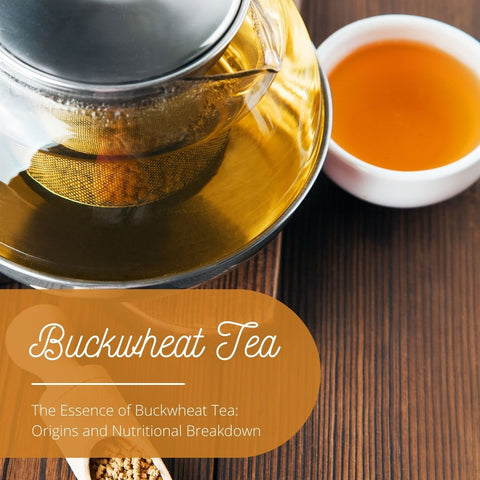Buckwheat tea, made from the roasted seeds of the buckwheat plant, provides numerous health benefits that make it an important addition to your wellness routine. In this blog, we'll look at 10 health benefits of buckwheat tea that you should know about.
The Essence of Buckwheat Tea: Origins and Nutritional Breakdown

Buckwheat tea is made from roasted seeds of the buckwheat plant (Fagopyrum esculentum), which is cultivated for its edible seeds and pseudocereal grains. Here's a quick overview of buckwheat tea, including its origins and nutritional breakdown:
Origins: Buckwheat is thought to have originated in Central Asia and has been grown for thousands of years in places like China, Japan, Korea, and Eastern Europe. It is a hardy plant that can grow in a variety of climates and soil conditions, making it a staple crop in many cultures.
Nutritional Breakdown:-
Protein: Buckwheat tea contains all nine essential amino acids, making it an excellent source of plant-based protein. It is particularly high in lysine, an amino acid that is often deficient in other grains.
-
Fiber: Buckwheat tea is high in dietary fibre, which aids digestion, regulates blood sugar levels, and promotes feelings of fullness and satiety.
-
Vitamins and Minerals: Buckwheat tea contains a variety of vitamins and minerals, including magnesium, manganese, zinc, iron, and B vitamins like niacin (vitamin B3) and folate.
-
Antioxidants: Buckwheat tea contains antioxidants such as rutin, quercetin, and catechins, which help protect cells from oxidative damage caused by free radicals.
-
Low Glycemic Index: Buckwheat tea has a low glycemic index, which means it does not cause a significant increase in blood sugar levels after consumption. This makes it an appropriate choice for people with diabetes or who want to manage their blood sugar levels.
From Field to Cup: The Journey of Buckwheat Tea
Buckwheat tea goes through several stages of cultivation, processing, and preparation before it reaches your cup. Here's an overview of the steps: cultivation, harvesting, processing, packaging, brewing, and enjoyment. Buckwheat tea is carefully grown, processed, and prepared from the field to the cup to preserve its natural flavours and health benefits. Buckwheat tea, whether enjoyed as a morning pick-me-up or a soothing bedtime beverage, is a distinct and flavorful option for tea enthusiasts looking for a wholesome and nourishing brew.
Unpacking the Nutrients: What Makes Buckwheat Tea a Superfood?
buckwheat tea is a nutrient-rich beverage that offers a wide range of health benefits, making it a valuable addition to a balanced diet and lifestyle. Whether enjoyed hot or cold, buckwheat tea provides a delicious and healthy option for tea enthusiasts seeking to nourish their bodies and promote overall well-being.
The Health Spectrum: Unveiling the 10 Key Benefits

Buckwheat tea's high nutritional content and bioactive ingredients provide a range of health advantages. The following ten main advantages of drinking buckwheat tea are included in your diet:
-
Heart Health: Buckwheat tea's antioxidants, like quercetin and rutin, support cardiovascular health by lowering inflammation and enhancing blood vessel function. Frequent consumption may reduce the risk of stroke and heart disease.
-
Digestive Health: The high dietary fibre content of buckwheat tea helps to maintain regular bowel movements, avoid constipation, and support healthy digestion. Fibre also promotes a healthy gut microbiota, which is necessary for overall digestive health.
-
Blood Sugar Control: Buckwheat tea is good for people with diabetes or at risk of getting the disease because it contains ingredients that help control blood sugar levels and enhance insulin sensitivity.
-
Weight control: By promoting fullness and decreasing appetite, the protein and fibre in buckwheat tea may help with weight control by regulating appetite and caloric intake.
-
Antioxidant Protection: Buckwheat tea is rich in antioxidants, which neutralize harmful free radicals and protect cells from oxidative damage. This antioxidant activity may help reduce the risk of chronic diseases such as cancer and diabetes.
-
Enhanced Blood Circulation: Buckwheat tea contains rutin, a flavonoid that strengthens blood vessels and enhances circulation, which may lower the risk of varicose veins and improve vascular health in general.
-
Bone Health: The minerals phosphorus, manganese, and magnesium found in buckwheat tea are crucial for strong, healthy bones. Frequent ingestion may aid in the prevention of bone fractures and osteoporosis.
-
Skin Health: Buckwheat tea's antioxidants and anti-inflammatory properties may help shield the skin from UV rays and environmental pollutants, which lowers the chance of early ageing and skin disorders like wrinkles and blemishes.
-
Eye Health: Research has demonstrated that rutin, an antioxidant present in buckwheat tea, enhances blood circulation to the eyes and guards against age-related eye conditions like cataracts and macular degeneration.
-
Immune Support: Buckwheat tea's vitamins, minerals, and antioxidants help the body fight off infections and illnesses by promoting a strong immune system.
Cardiovascular Companion: How Buckwheat Tea Supports Heart Health
Buckwheat tea serves as an excellent cardiovascular companion due to its various properties that support heart health. Here's how buckwheat tea benefits cardiovascular health:
-
Buckwheat tea is high in antioxidants like rutin, quercetin, and catechins. These antioxidants help the body neutralise free radicals, lowering oxidative stress and inflammation, both of which contribute to the development of heart disease.
-
Some studies suggest that buckwheat tea's flavonoids may help lower blood pressure by relaxing blood vessels and improving blood flow. This effect may help lower the risk of hypertension and cardiovascular events like heart attacks and strokes.
-
Regular consumption of buckwheat tea may help improve lipid profiles by reducing levels of LDL (bad) cholesterol and triglycerides while increasing levels of HDL (good) cholesterol. This balance of lipids in the blood can help prevent the buildup of plaque in the arteries and reduce the risk of atherosclerosis and coronary artery disease.
-
Rutin, a bioflavonoid found abundantly in buckwheat tea, has been shown to strengthen blood vessels and improve their elasticity. This can enhance blood vessel function, reduce arterial stiffness, and improve overall cardiovascular health.
-
Chronic inflammation is a major contributor to cardiovascular disease. The antioxidants and anti-inflammatory compounds in buckwheat tea help reduce inflammation throughout the body, including the cardiovascular system, thereby lowering the risk of heart disease.
-
Buckwheat tea is rich in fiber and protein, which promote feelings of fullness and satiety. By incorporating buckwheat tea into a balanced diet, individuals may better manage their weight, reducing the risk of obesity and associated cardiovascular complications.
-
Rutin found in buckwheat tea has anticoagulant properties that help prevent the formation of blood clots. This can reduce the risk of thrombosis, which can lead to heart attacks and strokes.
-
The combination of these cardiovascular benefits makes buckwheat tea a valuable addition to a heart-healthy lifestyle. Drinking buckwheat tea regularly can contribute to maintaining healthy blood pressure, cholesterol levels, and blood vessel function, ultimately supporting overall cardiovascular health and reducing the risk of heart disease.
The Weight Management Ally: Buckwheat Tea's Role in Your Diet
Buckwheat tea can help with weight management for a variety of reasons. Here's how it can help with your dietary goals:
-
High in Fibre: Dietary fibre, which increases feelings of fullness and satiety, is abundant in buckwheat tea. Eating and drinking high-fiber foods and beverages can help you feel fuller for longer, which lowers the risk of overindulging and promotes portion control.
-
Low in Calories: When drunk without milk or additional sweeteners, buckwheat tea is a low-calorie beverage. You can lower your total calorie intake and help your weight loss or weight maintenance goals by substituting higher-calorie drinks like sugary sodas or juices with buckwheat tea.
-
Supports Digestive Health: By encouraging regular bowel movements and avoiding constipation, the fibre in buckwheat tea promotes digestive health. Effective waste removal and nutrient absorption are critical for overall health and weight control, and they both depend on a healthy digestive system.
-
Controls Blood Sugar: Due to its low glycemic index, buckwheat tea does not quickly raise blood sugar levels after ingesting it. Blood sugar levels that are stable can lessen the tendency to crave sugary or high-carb foods, which can lead to weight gain.
-
Provides Nutrient Density: Despite being low in calories, buckwheat tea is rich in vitamins, minerals, and antioxidants that support overall health.Buckwheat tea, when ingested in a well-balanced diet, supplies vital nutrients that promote energy production, metabolism, and general health.
-
Hydration: Maintaining fluids is crucial for controlling weight because thirst can occasionally be confused with hunger. A hydrating beverage option that can help you meet your fluid requirements throughout the day and lessen the chance that dehydration will cause you to overeat is buckwheat tea.
-
Versatile and Enjoyable: Buckwheat tea can be enjoyed hot or cold and can be easily incorporated into your daily routine. Whether sipped as a comforting beverage in the morning or enjoyed as a refreshing drink with meals, buckwheat tea offers a versatile and enjoyable way to support your weight management efforts.
Gut Health Guardian: Digestive Benefits of Sipping on Buckwheat Tea
Buckwheat tea can act as a gut health protector, providing numerous digestive benefits. Buckwheat tea can help with digestive health because it is high in fibre, promotes healthy gut microbiota, supports regularity, aids in digestive comfort, lowers the risk of digestive disorders, maintains bowel health, balances blood sugar levels, and improves hydration. By incorporating buckwheat tea into your daily routine, you can reap the benefits of its digestive properties while also supporting gut health. Buckwheat tea's digestive health benefits can be enhanced further by pairing it with a well-balanced diet rich in fibre and probiotic foods.
Balancing Blood Sugar: Buckwheat Tea's Impact on Glycemic Control
Buckwheat tea can improve glycemic control, which makes it a good beverage option for people trying to maintain blood sugar balance. Here is how buckwheat tea can help with glycemic control:
-
Buckwheat tea has a low glycemic index (GI), which means that it does not cause a sudden increase in blood sugar levels after consumption. Foods and beverages with a low GI are digested and absorbed more slowly, leading to a gradual and sustained release of glucose into the bloodstream. This can help to reduce sharp fluctuations in blood sugar levels and promote consistent energy levels throughout the day.
-
Low-GI foods and beverages help regulate insulin response by slowly and steadily releasing glucose into the bloodstream. Insulin, a hormone produced by the pancreas, aids in the transport of glucose from the bloodstream to cells for energy or storage. By promoting a more balanced and controlled insulin response, buckwheat tea can help improve insulin sensitivity and reduce the risk of insulin resistance and type 2 diabetes.
-
The high dietary fibre content of buckwheat tea reduces the rate at which sugars and carbohydrates from other meals are absorbed. Fiber also helps promote feelings of fullness and satiety, reducing the likelihood of overeating and stabilizing blood sugar levels after meals.
-
Buckwheat tea contains antioxidants like rutin and quercetin, which have been shown to reduce inflammation and blood sugar levels. These antioxidants may improve insulin sensitivity and lower the risk of complications linked to high blood sugar levels, such as oxidative stress and inflammation.
-
Maintaining a healthy weight is crucial for glycemic control because excess body fat can lead to insulin resistance and type 2 diabetes. Buckwheat tea can aid in weight loss efforts by increasing feelings of fullness and satiety, lowering calorie intake, and promoting a healthy diet and lifestyle.
-
Proper hydration is essential for good blood sugar control because dehydration can impair kidney function and cause blood sugar imbalances. Buckwheat tea is a hydrating beverage that can help to maintain overall hydration and glycemic control.
Brewing Perfection: Tips and Tricks for the Best Buckwheat Tea Experience

Brewing buckwheat tea to perfection requires a few simple steps and techniques to extract the best flavour and aroma. Some buckwheat tea tips and tricks include using fresh, high-quality buckwheat tea, selecting the right water, preheating your teapot or cup, measuring the tea, determining the optimal water temperature, steeping time, covering while steeping, straining before serving, enjoying as-is or customising, and experimenting with cold brewing. By following these tips and tricks, you will be able to brew buckwheat tea to perfection and have a delightful and flavorful experience every time. Adjust the brewing parameters to your taste preferences, and experiment with different brewing methods to find your favourite way to enjoy buckwheat tea.
Mastering the Brew: Techniques for a Flavorful Buckwheat Tea
To master the brew and make a flavorful cup of buckwheat tea, consider the following techniques: water quality, water temperature, tea-to-water ratio, steeping time, cover while steeping, agitation, strain before serving, customisation, cold brewing, and quality tea leaves. By using these techniques and experimenting with different brewing parameters, you can perfect the brew and enjoy a flavorful cup of buckwheat tea tailored to your taste preferences. Adjust the brewing process as needed to achieve the ideal combination of flavour, strength, and aroma.
Variety in Every Sip: Exploring Different Buckwheat Tea Blends
Treating different buckwheat tea blends can be an exciting way to discover new flavours and experiences. Buckwheat tea blends and variations include pure buckwheat tea, buckwheat and green tea blend, buckwheat and roasted rice blend (genmaicha), buckwheat and herbal blend, buckwheat and fruit blend, flavoured buckwheat tea, buckwheat chai, buckwheat latte, and custom blends. Whether you prefer the pure and natural flavour of buckwheat tea or like to experiment with different blends and variations, there is something for everyone to discover and enjoy. Take your taste buds on a journey to discover your favourite buckwheat tea blends.
Incorporation into Daily Life: Creative Ways to Enjoy Buckwheat Tea
Adding buckwheat tea to your daily routine can be both enjoyable and rewarding. Iced Buckwheat Tea, Smoothie Booster, Cooking Liquid, Soup Base, Marinade or Sauce, Baking Ingredient, Buckwheat Tea Jelly, Buckwheat Tea Latte, Flavoured Ice Cubes, and Buckwheat Tea Popsicles are some unique ways to enjoy buckwheat tea besides drinking it hot. By being creative and thinking outside the box, you can find numerous ways to incorporate buckwheat tea into your daily life while also enjoying its distinct flavour and health benefits in various culinary creations. Experiment with various recipes and techniques to find new and exciting ways to drink buckwheat tea every day.
Proceed with Caution: Understanding Buckwheat Tea's Side Effects

While buckwheat tea has numerous health benefits, it is important to be aware of potential side effects, particularly for people who have certain health conditions or sensitivities. Considerations include allergies, oxalate content, blood sugar levels, gastrointestinal issues, medication interactions, pregnancy and breastfeeding, and moderation. Understanding these potential side effects and considerations allows you to consume buckwheat tea safely and responsibly as part of a healthy lifestyle. If you have any concerns or questions about incorporating buckwheat tea into your diet, speak with a healthcare professional for personalised advice and guidance.
Navigating Potential Side Effects: When to Exercise Caution
While buckwheat tea has numerous health benefits, it is critical to avoid potential side effects and exercise caution, especially in certain situations. Allergies, kidney stones, digestive sensitivities, blood sugar management, medication interactions, pregnancy and breastfeeding, and moderation are all situations in which you should exercise extreme caution. Buckwheat tea can be enjoyed safely and responsibly as part of a healthy lifestyle if you are aware of its potential side effects and exercise caution when needed. If you have any concerns or questions about incorporating buckwheat tea into your diet, speak with a healthcare professional for personalised advice and guidance.
Allergies and Interactions: Important Safety Information for Buckwheat Tea Drinkers
Individuals considering buckwheat tea should be aware of potential allergies and interactions to ensure safety. Here's some important safety information:
-
Allergies: Buckwheat is a common allergen, especially for people who are sensitive to grains or pollen. Anaphylaxis, hives, swelling, itching, and trouble breathing are some of the symptoms of buckwheat allergy. Before consuming buckwheat products, including buckwheat tea, make sure you thoroughly read product labels and speak with a healthcare provider if you have known allergies.
-
Interactions: Bioactive compounds found in buckwheat tea have the potential to interact with specific medications or supplements. Before incorporating buckwheat tea into your diet, see a healthcare provider if you are taking any medications or supplements for a specific health condition, especially blood thinners or diabetes medications, to avoid any potential interactions.
You can safely drink buckwheat tea as part of a balanced diet by being aware of potential allergies and interactions and by taking the necessary safety precautions. If buckwheat tea causes any negative side effects, stop using it right away and, if required, seek medical assistance.
Beyond the Beverage: Buckwheat Tea's Place in Culture and Wellness

Buckwheat tea's significance in culture and wellness goes far beyond its use as a beverage. It embodies cultural traditions, promotes holistic well-being, acts as a functional ingredient, encourages mindful living, and promotes environmental sustainability. As the demand for natural and healthful products grows, buckwheat tea remains a symbol of heritage, health, and natural harmony.
A Sip Through Time: The Cultural Significance of Buckwheat Tea
Buckwheat tea's cultural significance dates back centuries and is deeply rooted in the regions where it is grown. Here's a journey through time to uncover its cultural significance:
-
Buckwheat tea originated in Asia, where it has been cultivated for thousands of years. In countries like Japan and Korea, buckwheat tea has been enjoyed for generations as a traditional beverage known for its distinct flavor and health benefits.
-
In addition to its culinary importance, buckwheat tea has symbolic value in many cultures. It is associated with themes like simplicity, nourishment, and connection to the land. The act of sharing buckwheat tea with friends and family demonstrates hospitality and warmth, reflecting the cultural significance of communal gatherings and shared meals.
-
Buckwheat tea is now enjoyed by people all over the world who appreciate its unique flavour, nutritional value, and cultural significance. Whether sipped as a comforting brew on a chilly day or incorporated into culinary creations, buckwheat tea continues to be a symbol of cultural identity, tradition, and the enduring connection between people and the land.
Modern Wellness and Buckwheat Tea: A Holistic Approach to Health
Buckwheat tea is becoming increasingly popular in the world of modern wellness due to its holistic approach to health, which provides a variety of benefits that are consistent with contemporary wellness principles. Buckwheat tea contributes to overall well-being through nutritional density, antioxidant properties, heart health, digestive support, blood sugar management, stress reduction, natural hydration, and mindful living. By embracing buckwheat tea's holistic benefits, people can improve their overall wellness and cultivate a balanced approach to health that addresses physical, mental, and emotional needs. Buckwheat tea, whether consumed as a daily ritual or incorporated into wellness practices, is a natural and nourishing beverage option that promotes holistic well-being in today's modern world.
Embracing Buckwheat Tea: Integrating Tradition and Science for Optimal Health

Embracing buckwheat tea entails combining traditional wisdom with scientific knowledge to improve health and well-being. Individuals can maximise the holistic health benefits of buckwheat tea by combining its cultural heritage with modern scientific understanding. Here's how to embrace buckwheat tea while respecting tradition: scientific exploration, nutritional awareness, a holistic health approach, personalised wellness, collaborative learning, and cultural appreciation. Buckwheat tea becomes more than a beverage when approached holistically, honouring both cultural wisdom and modern knowledge.
















